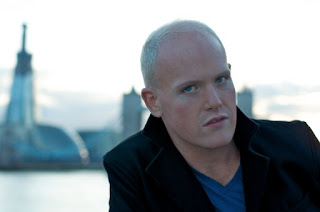 | |
| Nicky Spence |
But when we arrived at Middle Temple Hall last night (8 June), it was to find that Toby Spence was unable to sing. He had been replaced that afternoon, at very short notice, by his namesake Nicky Spence (who reputedly had forgone the Lady Gaga and Tony Bennett concert at the Royal Albert Hall). Because of the coincidence of repertoires of the two concerts, Nicky Spence was able to sing both the planned RVW items. Toby Spence's intention to continue to sing Britten's song cycle On this Island was prevented by his voice giving up entirely, so Nicky Spence and Julius Drake performed a group of Britten's folk-song arrangements which they 'cobbled together during the interval' as Nicky Spence put it. Not that it sounded that way, in fact none of the programme did.
 |
| The Doric String Quartet |
The programme opened with tenor Nicky Spence, and viola player Hélène Clément (from the Doric String Quartet) and pianist Julius Drake in RVW's Four Hymns. Written between 1912 and 1914 these set four hymn texts by various writers, Jeremy Taylor (1613-1667), Isaac Watts (1674-1748), Richard Crashaw (1613-1649) and Robert Bridges (1844-1930). In the songs RVW expanded on the style which he had developed in the Five Mystical Songs (1911), and they inhabit the same mystical, ecstatic sound-world. Nicky Spence's performance belied the last minute nature of the arrangements, and he sang with a firm tone and a lovely directness, producing some lovely hushed moments in the third song. In all of them he conveyed a vivid (at times fervent) sense of engagement with the texts and their meanings, projecting a sense of strongly muscular Christianity. He was finely complemented by the elegant playing of Hélène Clément, in a viola part which complements and comments rather than accompanying the voice, and the sympathetic accompaniment of Julius Drake.
Rather remarkably Elgar's Piano Quintet, which dates from 1917, is later than either of the RVW pieces in the programme. Elgar wrote the quintet as part of a group of major chamber works which he wrote after leaving London towards the end of the First World War. These three works (the Violin Sonata, String Quintet and Piano Quintet), plus the Cello Concerto can be seen as Elgar's response to the war. The tone of the Piano Quintet is elegiac, with its vigour constantly undermined by more mysterious and melancholy music. The performance from Julius Drake and the Doric String Quartet was very subtle, fine-grained and very refined, but richly expressive without ever taking anything away from the music.
 |
| Julius Drake photo Jack Liebeck |
Throughout the work the performers brought out the sense of Elgar's fascination with the potential for complementarity and contrast of timbre and texture which the medium brought. This wasn't a Big Romantic Performance, but one of Schumannesque subtlety which however did not hold back at key moments. The Doric String Quartet's sense of phrasing was remarkable and whilst they did not use portamento as such, you felt that they had been listening to contemporary performances of the work.
After the interval Nicky Spence and Julius Drake gave us a selection of folk-song arrangements, mainly in Benjamin Britten's arrangements. The performed Can ye sew cushions, Ca' the yowes, Wee Cooper O'Fife and Oliver Cromwell. Nicky Spence is from Scotland and it was lovely to hear the three Scots pieces sung with a real burr to the accent, and a braw directness. Nicky Spence did the Wee Cooper O'Fife unaccompanied, at quite a speed and with all the actions! Oliver Cromwell was taken at a similarly fast tempo. Nicky Spence sang from memory and there was no sense of last minute about the performances.
RVW wrote his song cycle On Wenlock Edge in 1909, not long after he had been to France for lessons with Ravel (for 'a bit of French polish'). Setting seven poems by AE Housman, for tenor, piano and string quartet, RVW would subsequently make an orchestral version of the cycle but I feel that the original is by far preferable. Julius Drake and the Doric String Quartet brought the same qualities of refinement, subtlety and fine phrasing to the work that we had experienced in the Elgar, with a lovely sense of dynamism to the phrasing. On Wenlock Edge saw Nicky Spence singing with a bright, vibrant line, and there was a lovely sense of detail and character from all performers. From far, from even and morning was nicely intimate with some magical suspended moments in the instrumental textures. Is my team ploughing opened with a lovely hushed veiled tone from the strings and throughout Nicky Spence brought a strong sense of narrative. O, when I was in love with you had sly, robust charm, Bredon Hill was gorgeous in its atmospherics and the vivid intensity of th quiet moments and Clun concluded the cycle with its lyrical narrative.
Elsewhere on this blog:
- Superb musical values: Cosi fan tutte at Garsington - opera review
- Warm and witty: Jonathan Dove's Flight at Holland Park - opera review
- Purity and beauty: Stile Antico at Spitalfields - concert review
- Vivid colours: Handel Israel in Egypt at Spitalfields Music Summer Festival - concert review
- Highly imaginative: Isis Ensemble, Jacques Cohen - CD review
- A triumph: Puccini's Il Trittico at Opera Holland Park - opera review
- Vibrant ensemble: Wolf-Ferrari's I gioielli della Madonna in Bratislava - Opera review
- East of Tallinn: Orient Music Festival - conference report
- Surrender: Ilona Domnich in an imaginative opera arias recital - CD review
- Bach Pilgrimage revisited: Cantatas volume 8, John Eliot Gardiner - CD review
- Myth and magic: Andrew Griffiths & Londinium - concert review
- Stunning display: Tallinn Chamber Orchestra in Cardiff - concert review
- Home











No comments:
Post a Comment